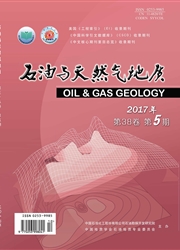

 中文摘要:
中文摘要:
对济阳坳陷东营凹陷古近系渐新统沙河街组粘土矿物含量较高的烃源岩粉碎后,提取粒径小于2μm的粘土组分,运用原位漫反射红外光谱技术研究有机质与蒙皂石结合作用机制。当升温至250℃以上时,谱图显示水与羧基振动峰位置发生同步性对应变化,在400℃附近两峰同时消失。将每50℃间水和羧基振动峰面积的差值量作对比发现,在250℃以上温度段面积损失量具有明显的相关性。X-射线衍射结果显示,蒙皂石层间由于物质柱撑作用,d001衍射峰直到450℃才收缩至1.0 nm,表明含羧基有机分子主要通过氢键与蒙皂石层间水合阳离子相互作用,层间水分子作为"桥梁"将有机质和蒙皂石联结起来。由于"水桥"的联结作用,"水桥"水分子的脱附温度和所联结羧酸分子的分解温度均明显升高,在较高温度下水桥断裂,二者才从蒙皂石层间一同排出。泥质烃源岩中有机质-粘土相互作用机制——水桥机理及其排水滞后性特征,对源岩的生烃、排烃和油气的初次运移具有十分重要的影响。
 英文摘要:
英文摘要:
To examine the role of water in the interaction of organic matter with smectite in argillaceous source rocks with situ DRIFTS,we make a study of clays with grain-size less than 2μm extracted from hydrocarbon source rocks with high clay content in the Neocene,Jiyang Depression,eastern China.The DRIFT spectra show that the evolution of the adsorption water is accompanied by significant changes in the location and shape of the carboxyl above 250°C and both of them almost disappear at 400℃.An attempt for semi-quantitative measurement of vibration peaks is also carried out.Result shows that the loss of adsorption water and carboxyl are in proportion above 250°C,suggesting most carboxylic acids interact with interlayer hydrated cations of smectite through hydrogen bond,and water molecules are bridges between carboxylic acids and smectite,a most important mechanism for organo-smectite interaction.Due to the effect of water bridge,dehydrate temperature of water and carboxylic acids are higher than that of pure smectite and carboxylic acids.As water bridge breakdown at higher temperature,water molecules and carboxylic acids were expelled from interlayer of smectite simultaneously.The water bridge mechanism of organo-smectite interaction and dehydration lagging of water bridge and carboxylic acids have a great influence on hydrocarbon generation,expulsion and primary migration.
 同期刊论文项目
同期刊论文项目
 同项目期刊论文
同项目期刊论文
 期刊信息
期刊信息
